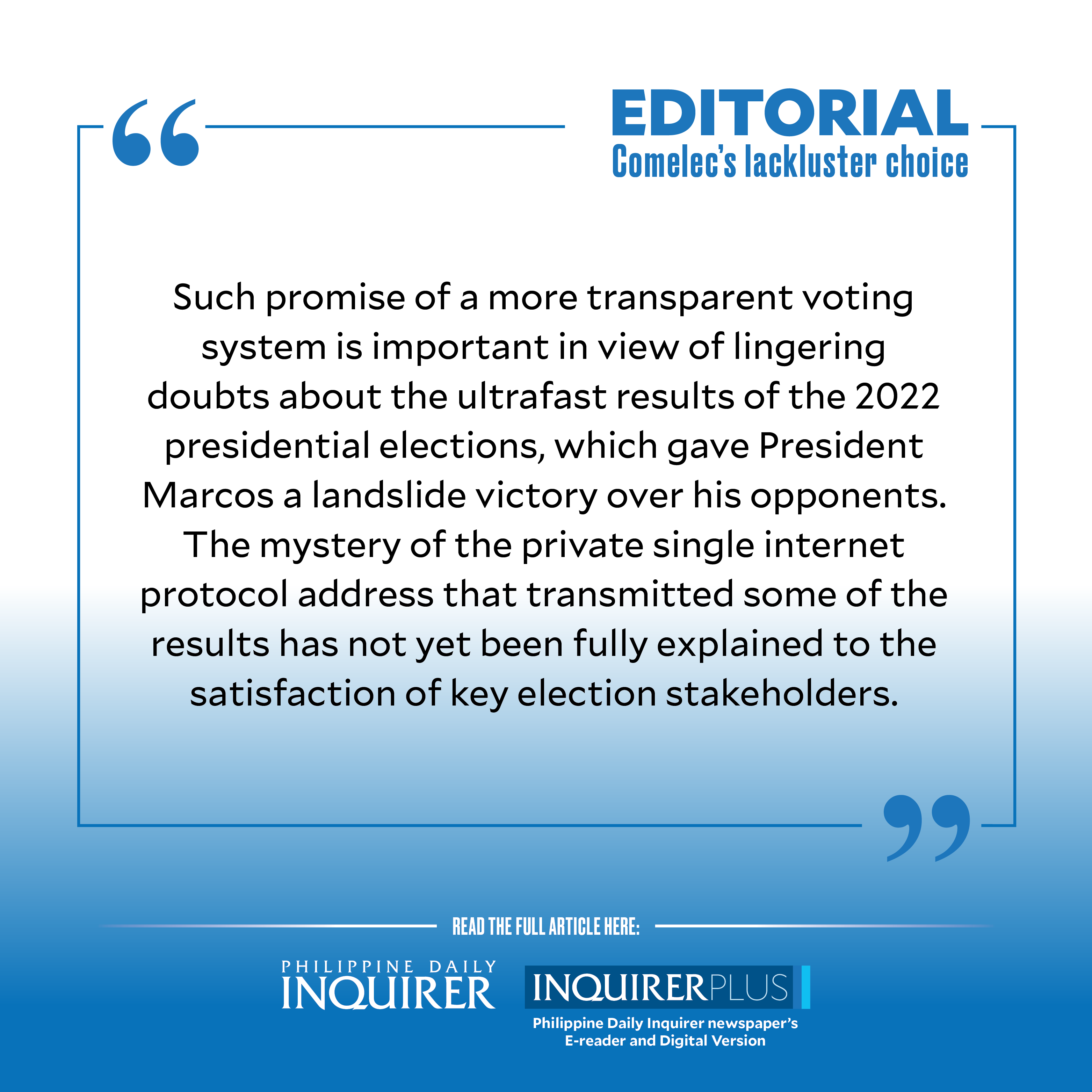
Why does the Commission on Elections (Comelec) always end up with controversial election technology providers?
It’s a question raised anew following the poll body’s selection of a South Korean firm—Miru Systems Co. Ltd.—as a provider of automated voting machines for the upcoming national and local elections.
In fact, the Comelec had no choice but to award the nearly P18 billion contract to Miru as it was the lone bidder for the Full Automation System with Transparency Audit/Count, which involves the lease of 110,000 automated counting machines and other provisions for the 2025 midterm polls.
This, even after Miru failed in the first round of bidding due to problems in its original documents, prompting the poll body to extend the deadline and call for another bidding.
Shady background
With lack of scrutiny on Miru and its three local partners—Integrated Computer Systems, St. Timothy Construction Corp., and Centerpoint Solutions Technologies Inc.—concerns raised about the Korean firm are understandable. The group Democracy Watch Philippines has called on the Comelec to probe the company’s record, saying it was linked to “catastrophic failures” of elections in the Democratic Republic of the Congo (DRC), Iraq, and Argentina, claims that Miru has denied.
Comelec chair George Garcia said the poll body’s bids and awards committee was aware of the claims about malfunctioning electoral systems and irregularities involving Miru’s operations in the DRC and Iraq, and had investigated these allegations. But he did not elaborate on the results of that investigation. And why the poll body awarded the project to Miru anyway.
These allegations recall the similar shady background attributed to Smartmatic, which had monopolized voting systems in the Philippines since it embarked on automated elections in 2010. Smartmatic’s entanglement with questionable elections in the United States and Venezuela, where the company was founded, was also raised by critics.
Suspicious glitches
But more than its background, Smartmatic proved to be a disappointment with its malfunctioning machines, suspicious glitches, and other anomalies that put the integrity of the recent presidential election under a cloud of doubt.
This explains why the Comelec’s sudden announcement in November 2023 of Smartmatic’s disqualification from all future Philippine elections prompted a sigh of relief in many quarters. It didn’t matter that the reason cited for this action was Smartmatic’s alleged bribery of former Comelec chief Andres Bautista in the 2016 elections, and not the integrity of the election results.
It would have been a fresh start for Comelec to find a new election systems provider with an excellent and clean track record. Instead, all it can come up with is the joint venture between the Korean firm and the three Filipino companies whose principals and their affiliations are yet to be subjected to public scrutiny.
Source code
As if to make up for that lackluster choice, the Comelec announced during the signing of the award for Miru last week that the company had agreed to make accessible to the public the source code of its automated counting and audit system for full transparency. Garcia said the source code will be posted on the Comelec website to enable anyone to access and test its vulnerabilities.
“This is the first time that this will happen, that the Comelec received such an offer,” Garcia said.
This, at least, is a reassuring development given that the source code—the computer instructions that determine how the computer scans and counts the ballots—had spawned controversies in past elections. In 2013, the Comelec even threatened to file a case against Smartmatic after it failed to provide the source code for its automated systems.
Moreover, Garcia said Miru has promised to provide 12,000 cameras in different polling precincts around the country and agreed to the Comelec’s request for customization of the systems to “be transparent and further allay any issues and irregularities.”
Lingering doubts
Such promise of a more transparent voting system is important in view of lingering doubts about the ultrafast results of the 2022 presidential elections, which gave President Marcos a landslide victory over his opponents. The mystery of the private single internet protocol address that transmitted some of the results has not yet been fully explained to the satisfaction of key election stakeholders.
The challenge is enormous, given that an entirely new vote-counting system will be used. Sadly, we’d only know on election day itself whether Miru would live up to expectations.
The Comelec must thus pay utmost attention to detail in every step of its engagement with Miru to prevent untoward incidents such as glitches and telltale signs of fraud and vote count manipulation.
This early, the problem of language is seen as a red flag in the Korean firm’s contract. The Comelec must ensure that nothing gets lost in translation, much less in vote counting.